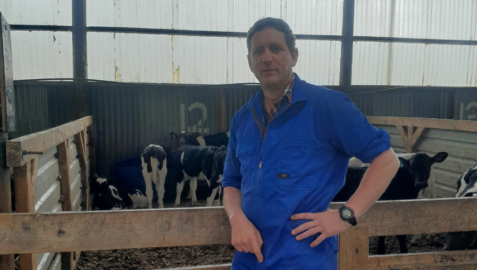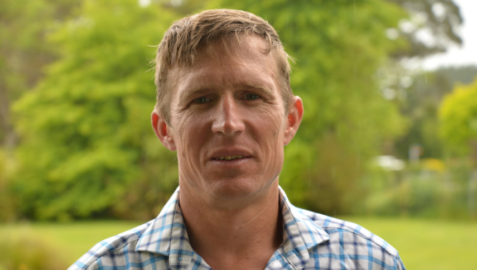
Building Resilience on Farm
Module Overview
Otago high country farmer Jack Cocks has spent the past eleven years recovering from a life-threatening brain aneurysm. He has since given around 30 presentations, here and overseas, on how farmers can be resilient to ‘thrive in the face of adversity’. He shares his insights with Farmstrong.
Tell us a little about your background Jack.
I grew up on a sheep and beef farm in the South Island. Went to Lincoln, spent five years overseas, did a Master’s in economics in the US, then came back to New Zealand and got involved in agribusiness consulting. About 16 years ago, my wife Kate and I got the chance to come back to her family farm and manage it. So we’re a high country station in Otago and run merino sheep and beef cattle.
How come you have such an interest in resilience?
Twelve years ago, I was 35, had a beautiful wife and kids and was running a high country station. Life was marvellous. Roll forward 12 months and suddenly I was in a coma in ICU in Dunedin Hospital and life was pretty average. I’d had a massive brain aneurysm. Over the next two years I spent four months in the hospital and had eight major surgeries, followed by two years of no surgeries and no time in hospital. I was thinking I was through this challenge. Then, in years five and six after the aneurysm, scarring from the blood in my brain caused pressure issues and resulted in another four months in hospital and seven more surgeries.
How do you get through an ordeal like that?
When I was in hospital I received some wonderful advice. I think it was about surgery number 8 out of 15, and I was back in a walking frame and getting pretty frustrated and somebody said to me, ‘Jack, you know, you shouldn’t even be alive. You’re actually doing pretty well. Shit happens.’
Excuse my language, but it was brilliant advice. When there’s so much outside your control you’ve just got to focus on what you can do. It also helped me realise the challenge was a mental one as much as a physical one. I spent a lot of time in bed thinking about what I needed to do to recover and keep well. That’s why I decided to do a Kellogg study to see how other farmers dealt with adversity once I got back on my feet.
What did you learn?
I discovered there was lots of literature about climatic resilience, financial resilience and resilient farming systems but nothing about how we create more resilient farmers.
And yet we often hear the word resilience mentioned in relation to farmers. When farmers are going through a drought, they always say farmers are resilient. When farmers are recovering from a cyclone, people say they’re resilient. But what does it actually mean to be resilient? A lot of people seem to think resilience is just about being able to take the hits and keep going, but there’s more to it than that.
So what does being resilient mean?
I think resilience is the ability to thrive in the face of adversity, not just bounce back or survive but ‘thrive’ when things get tough. Even though you wouldn’t want to go through the experience again, you can use it to learn something that’s worth knowing about yourself and life.
What practical steps can people take to achieve that?
Through my Kellogg study I met five inspirational farmers who’d thrived in the face of major adversity. My study showed farmers who thrive despite adversity have three things in common. First, they know their purpose. They know ‘why’ they’re doing what they’re doing. Second, they know their ‘who’ – the key people who can help them through adversity and they connect regularly with them – family, friends, neighbours. Finally, they know their ‘what’ – the things they need in their lives to keep well and be happy.
What are the benefits of this approach?
Well, if we’ve got a strong reason why we’re farming sheep and beef in the Wairarapa, or why we’re milking cows on the Canterbury plains, it makes it much easier for us to get on with the job no matter what’s happening.
For farmers starting out it could be growing your equity to give your family options. For a family farm, it could be carrying on your family’s legacy. Having a strong sense of purpose means when things get tough in the industry you won’t give up.
The trouble is when we’re busy we can easily get mixed up between goals and purpose. We often just talk about milk solids or lambing percentage but why are we doing this? Knowing our ‘why’ motivates us to achieve these goals.
How do you maintain resilience on a daily or weekly basis?
This is where being Farmstrong comes in because when our well-being’s better, we’re much more able to handle any adversity. So first ask yourself, ‘what do I need to be well and to be happy?’ and then make that part of your working week.
What do you do to maintain your own wellbeing?
Exercise is a big one for me. I’ll spend a bit of time on an exercise bike on the porch and do weights and balance exercises. Doing that for half an hour every day not only helps me physically, but it’s also good for me mentally.
Anything else?
Practicing gratitude is big for me. The science of wellbeing says that just noticing and enjoying these little wins really improves our wellbeing. Over time, you actually rewire your brain and start focusing on the good things in life as opposed to focusing on the negatives.
I learnt this during my recovery. When my balance was good enough to put on my undies standing up, that was a milestone. When the doctors let me have a beer, that was another reason to celebrate.
Writing down three things I’m grateful for at the end of each day is something I’ve been doing for the past few years. If I’ve cooked an awesome family meal or one of the kids had a great game of rugby or we’ve got some good wool prices, I jot it down on my phone. Just doing that makes you feel better.
I think the key thing with wellbeing is adopting the Farmstrong message of ‘find out what works for you and ‘lock’ it in’. This is what works for me, but we’re all different.
Why should busy farmers care about building skills in this area?
Because adversity is so common and constant nowadays. We had COVID, we’ve got a cost of living crisis, climate change, weather events, market changes, new rules and regulations – we actually need to be able to thrive in the face of adversity, not just take the hits.
Looking back on your journey what’s your message to anyone doing it tough out there?
When I was really crook in 2017 and could barely talk and used a walking frame, a doctor asked me to look outside the window towards the Remarkables and tell them what I saw.
I said, ‘well, I can’t see anything’, because it was a cloudy, drizzly day in Queenstown. And then she said, ‘what does that look like on a good day?’ And I said, ‘well, it’s beautiful. It’s the Remarkables, it’s majestic.’
And she said, ‘Well, that’s hope, that’s knowing what the future looks like, even though you can’t see it today.’
Farmstrong is a nationwide, rural wellbeing programme that helps farmers manage the ups and downs of farming and growing. Last year, 15,000 farmers and growers improved their wellbeing thanks to Farmstrong. To find out what works for you and lock it in, visit www.farmstrong.co.nz


